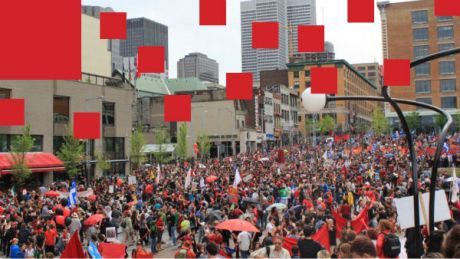Features
You are here
Developments in the Quebec student strike

June 20, 2012
Now entering its fifth month, the student strike in Quebec has survived despite repression, bullying and worse, culminating in the draconian bill 78.
The bill is aimed at dividing the movement, undermining the right to protest, and undermining the student right to strike. Bill 78 lays bare the goals and interests of the government—quashing protest at all costs (for a detailed look go here).
The casserole demonstrations, a magnificent upsurge of public anger against Charest, his government and all of its excesses, are an outpouring of exuberant energy aimed at denouncing bill 78.
In the past month, aside from the casseroles events, which multiplied, peaked, and have now settled into a steady rhythm, there have been a few key moment—some going largely unnoticed by the mainstream media and even the left, and others highlighted in various ways by the media in and outside Quebec.
Neighbourhood assemblies
The most important recent development in the movement has been the commencement of regular public assemblies in neighbourhoods, often weekly, either before or after casseroles. In these neighbourhood assemblies can be seen the influence of the student movement, with its emphasis on direct democracy in stark contrast to the dictatorial approach taken by Charest and his Ministers. Clearly the influence of the Occupy movement has been strong as well.
Assemblies have been taking place in, at least, Ahuntsic, Centre-Sud, Côte-des-neiges, Hochelaga-Maisonneuve, Notre-Dame-de-Grâce, Plateau-Est, Pointe St-Charles, Rosemont-Petite-Patrie, St-Henri, Verdun, Villeray, and Vieux-Longueuil. In many cases these assemblies are places for people to voice their reasons for joining the protests. While small and relatively unfocussed as yet, these meetings could eventually become centres of organizing as the movement progresses.
Grand Prix
The highest profile event in the last month centred around protests against the Grand Prix in Montreal. The student federations stated clearly they had no intention of preventing people from attending, only to deliver a message to the masses of people converging for the event. Despite this, police organized extremely repressive measures to control the flow of people through the subway system, establishing bases and posting dozens of offices at various metro stations.
Reports are still coming in, but in one example a young woman trying to visit her parents was refused entry and badly treated; in another, a woman was arrested and held in prison for a day for reading George Orwell’s 1984 on the subway. Remarks by privileged rich boy race driver Jacques Villeneuve that students should “go back to school” backfired across the board, drawing criticism from protesters and mainstream media alike.
Debates
At the same time, two significant debates are raging among the left, progressives and people new to the movement.
First, discussion of a social strike, until recently only a peripheral phenomenon, has begun to gather momentum. La CLASSE has championed a social strike from the beginning, and so have some others, but the labour movement—and not just the high leadership—is pessimistic about being able to mobilize. Careful consideration will be needed to find ways to get that ball rolling, and roll it must if the movement is to have staying power.
That’s because the other big question for everyone is the possible fall election. Renewed calls for a united strategy for anyone-but-Charest have received endorsement from over 5000 people, among them some well-known figures from the environmental justice and labour movements as well as artists. Others, among them Quebec solidaire (QS), are clearly ranged against what they see as a passive and pessimistic response to a real concern: that Charest will be re-elected.
The fact is that Charest’s liberals could be re-elected even with an electoral pact or strategic voting. The question for the left and for the movement is whether it makes sense in the long run to ally with the PQ in order to try to defeat them.
The PQ is a neoliberal ruling class party. An alliance with them, solely in order to defeat bill 78, is a deal with the devil. (To see a translated open letter by QS responding to this debate, go here).
But mobilizing is also a big challenge.
Next steps
Inside Quebec, activists will need to continue to take seriously the significant challenge of getting labour to move. Working through QS and from within unions and community groups, there is an opening, and those of us who can, need to take it.
Outside Quebec, activists in the rest of Canada should continue to fight their own governments against austerity. And, as much as possible, the call for donations to the CLASSE fund to oppose the bill should continue.
A sustained struggle can end the bill—maybe not via an election this fall, and maybe not through the courts, but in the long run in the best way possible: one that will see an ongoing transformation of the consciousness of Quebeckers towards building a better Quebec and a better world.
Section:
Topics:
- Log in to post comments










